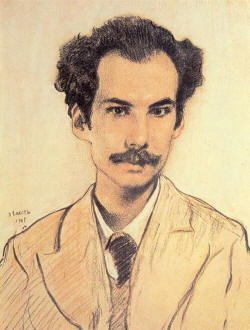

Queer Places:
Novodevichy Cemetery
Moscow, Moscow Federal City, Russia
 Boris Nikolaevich Bugaev,
better known by the pen name Andrei Bely or Biely (26 October [O.S.
14 October] 1880 – 8 January 1934), was a Russian novelist, poet, theorist,
communist, and literary critic. His novel
Petersburg was regarded by
Vladimir Nabokov as one of the four greatest novels of the 20th century.[1][2]
At the end of January 1908 Bely wrote to
Alexander Blok that "I fell terribly in love with
Mikhail Kuzmin". Bely
wrote almost as effusively to Kuzmin himself. The sentiment was apparently
not reciprocated.
Boris Nikolaevich Bugaev,
better known by the pen name Andrei Bely or Biely (26 October [O.S.
14 October] 1880 – 8 January 1934), was a Russian novelist, poet, theorist,
communist, and literary critic. His novel
Petersburg was regarded by
Vladimir Nabokov as one of the four greatest novels of the 20th century.[1][2]
At the end of January 1908 Bely wrote to
Alexander Blok that "I fell terribly in love with
Mikhail Kuzmin". Bely
wrote almost as effusively to Kuzmin himself. The sentiment was apparently
not reciprocated.
Boris Bugaev was born in Moscow, into a prominent intellectual family. His father, Nikolai Bugaev, was a leading mathematician who is regarded as a founder of the Moscow school of mathematics. His mother was not only highly intelligent but a famous society beauty, and the focus of considerable gossip. Young Boris was a polymath whose interests included mathematics, biology, chemistry, music, philosophy, and literature. Bugaev attended university at the University of Moscow.[3] He would go on to take part in both the Symbolist movement and the Russian school of neo-Kantianism. Bugaev became friendly with Alexander Blok and his wife; he fell in love with her, which caused tensions between the two poets.
Nikolai Bugaev was well known for his influential philosophical essays, in which he decried geometry and probability and trumpeted the virtues of hard analysis. Despite—or because of—his father's mathematical tastes, Boris Bugaev was fascinated by probability and particularly by entropy, a notion to which he frequently refers in works such as Kotik Letaev.[4]
As a young man, Bely was strongly influenced by his acquaintance with the family of philosopher Vladimir Solovyov, especially Vladimir's younger brother Mikhail, described in his long autobiographical poem The First Encounter (1921); the title is a reflection of Vladimir Solovyov's Three Encounters. It was Mikhail Solovyov who gave Bugaev his pseudonym Andrei Bely.
Bely's symbolist novel Petersburg (1916; 1922) is generally considered to be his masterpiece. The book employs a striking prose method in which sounds often evoke colors. The novel is set in the somewhat hysterical atmosphere of turn-of-the-century Petersburg and the Russian Revolution of 1905. To the extent that the book can be said to possess a plot, this can be summarized as the story of the hapless Nikolai Apollonovich, a ne'er-do-well who is caught up in revolutionary politics and assigned the task of assassinating a certain government official—his own father. At one point, Nikolai is pursued through the Petersburg mists by the ringing hooves of the famous bronze statue of Peter the Great.
With the advent of communism Bely was denounced as "irrelevant" and "a literary corpse" by Soviet critics, who found the mysticism of his writing suspect; he left Russia in 1921 but returned two years later, where he tried unsuccessfully to adapt himself to the new regime.
In his later years Bely was influenced by Rudolf Steiner’s anthroposophy[5][6] and became a personal friend of Steiner's. He spent time between Switzerland, Germany, and Russia, during its revolution. He supported the Bolshevik rise to power and later dedicated his efforts to Soviet culture, serving on the Organizational Committee of the Union of Soviet Writers.[7] His death at 53 of heart disease probably spared him a much worse fate at the hands of Stalin's secret police.
The Andrei Bely Prize, one of the most important prizes in Russian literature, was named after him. His poems were set to music and frequently performed by Russian singer-songwriters[8]
My published books: